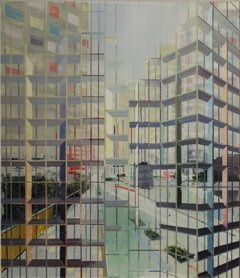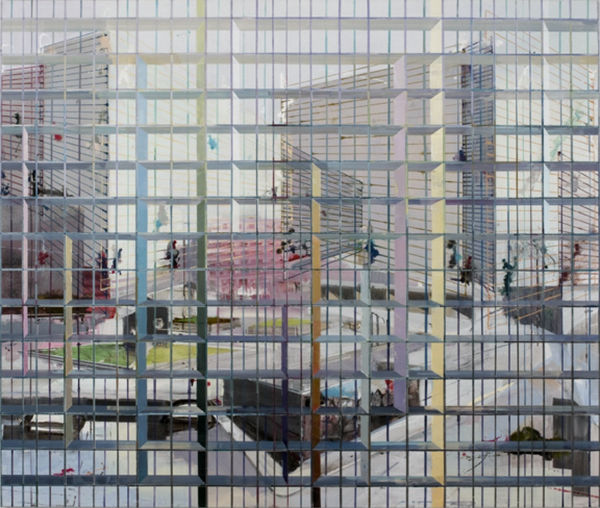Driss Ouadahi: Densité
New York Gallery
Before immigrating to Europe and studying at the Kunstakademie in Düsseldorf, Algerian Driss Ouadahi studied architecture. His paintings of the ubiquitous high-rise, the legacy of Modern Architecture’s failed promise to improve the human condition, are renderings of impenetrable boundaries of steel, glass and concrete.
Ouadahi’s exploration begins with images of the enormous public housing developments in Algiers that had been modeled on France’s habitation à loyer modéré (housing at moderated rents). In North Africa, these monoliths accommodate displaced rural populations; in Europe, they house immigrants from former colonies. They are symbols of the politics of class, religion and ethnicity. Reminders of “otherness.”
Behind Ouadahi’s facades, the residents are neatly invisible. Even when the buildings are transparent, a lattice-like structure separates the viewer from the view. There are references to mashrabiya — the screened windows in traditional North African and Middle Eastern architecture — as well as to steel frame construction, scaffolding and barred windows. Boundaries abound.
In addition to the permutations of “cityscape” which Ouadahi has been exploring in the last few years, this exhibition will be comprised of two new types of paintings. The first are rigorously formal renderings of chain-link fencing that are both minimalist abstractions and a signifier of separation.
The second are depictions of tiled passageways, akin to subway systems like the Paris Métro. Fluorescent-lit and grimy, they are labyrinthian and claustrophobic. Ostensibly their purpose is movement from one place to another. But they feel more like blocked escape routes or morgues. They speak to restricted mobility in a supposedly global culture.
In spite of their beauty, all of these paintings address dehumanization. Literally, they are devoid of people. Metaphorically, they speak to separateness and the unwillingness to recognize the humanity in those who are different.
-
 Driss OuadahiParking, 2010oil on linen35.46 x 39.4 inches
Driss OuadahiParking, 2010oil on linen35.46 x 39.4 inches
90 x 100 cms -
 Driss OuadahiEnd of the Line, 2010oil on linen66.98 x 78.8 inches
Driss OuadahiEnd of the Line, 2010oil on linen66.98 x 78.8 inches
170 x 200 cms -
 Driss Ouadahi08-3, 2008watercolor on paper22.06 x 29.94 inches
Driss Ouadahi08-3, 2008watercolor on paper22.06 x 29.94 inches
56 x 76 cms -
 Driss OuadahiWhite Night, 2009watercolor on paper22 x 30 inches
Driss OuadahiWhite Night, 2009watercolor on paper22 x 30 inches
56 x 76 cms -
 Driss OuadahiFrozen Shadows, 2010oil on linen43.34 x 51.22 inches
Driss OuadahiFrozen Shadows, 2010oil on linen43.34 x 51.22 inches
110 x 130 cms -
 Driss Ouadahila grande Place, 2010oil on linen74.86 x 94.56 inches
Driss Ouadahila grande Place, 2010oil on linen74.86 x 94.56 inches
190 x 240 cms -

-
 Driss Ouadahizu besseren Zeiten, 2010oil on canvas59.1 x 51.22 inches
Driss Ouadahizu besseren Zeiten, 2010oil on canvas59.1 x 51.22 inches
150 x 130 cms -
 Driss OuadahiFences 4, 2010oil on linen66.98 x 78.8 inches
Driss OuadahiFences 4, 2010oil on linen66.98 x 78.8 inches
170 x 200 cms -
 Driss OuadahiVis à vis, 2010oil on linen35.46 x 39.4 inches
Driss OuadahiVis à vis, 2010oil on linen35.46 x 39.4 inches
90 x 100 cms -
 Driss OuadahiDesenclavement, 2010oil on linen74.86 x 94.56 inches
Driss OuadahiDesenclavement, 2010oil on linen74.86 x 94.56 inches
190 x 240 cms -

-
 Driss Ouadahile tag, 2008oil on linen66.98 x 78.8 inches
Driss Ouadahile tag, 2008oil on linen66.98 x 78.8 inches
170 x 200 cms -
 Driss OuadahiFences 5, 2010oil on linen78.8 x 66.98 inches
Driss OuadahiFences 5, 2010oil on linen78.8 x 66.98 inches
200 x 170 cms -
 Driss OuadahiTraces, 2010oil on linen70 7/8 x 86 5/8 in
Driss OuadahiTraces, 2010oil on linen70 7/8 x 86 5/8 in
180.1 x 220.2 cm

















